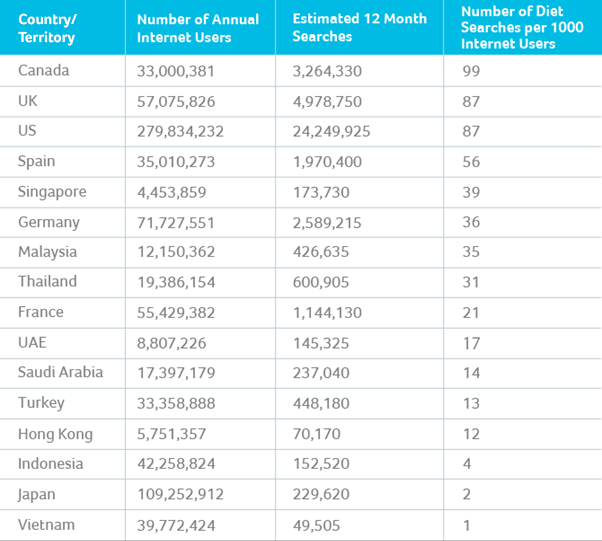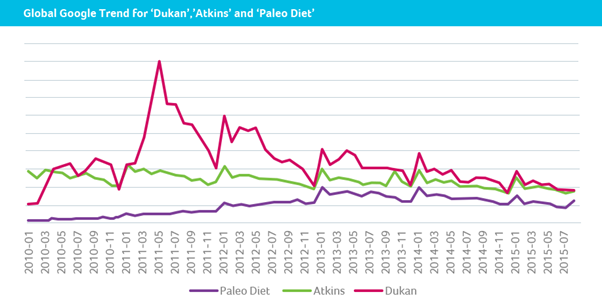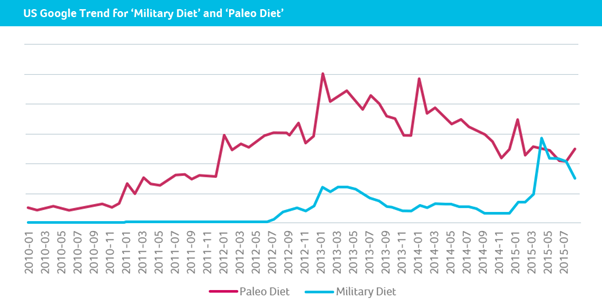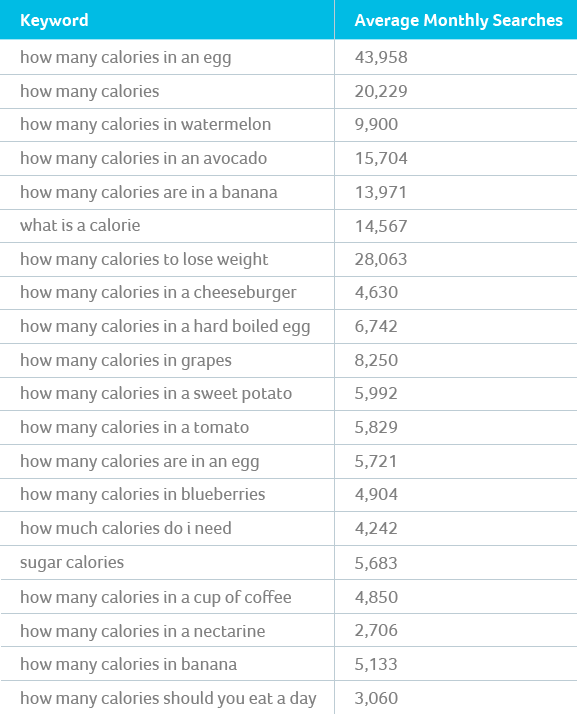We use cookies to give you the best possible online experience. See our cookie policy for more information on how we use cookies and how you can manage them. If you continue to use this website, you are consenting to our policy and for your web browser to receive cookies from our website.
Press Release
Consumer online searches reveal the most popular diets around the world
- Aetna International’s new research highlights global interest in Dukan, Paleo and Atkins diets -
Every month about two million people around the world type the word “calories” into Google’s search bar looking for information about the calorific value of different meals or ingredients.
What they find is a bewildering array of information about what might, or might not, help them stay in shape.
Looking at the data behind consumers’ internet searches gives interesting insight into perennial concerns about fitness and weight.
Our research into what people have been searching for online in 16 countries over the last five years has highlighted different trends around diet and wellbeing in different parts of the world.
The data shows how diets rise in popularity as they become fashionable, or fall out of favour when a new approach starts to steal the headlines.
Overall, it seems that Canadians are the most likely to be looking for information online about diets when you take account of the size of the online population of each country (table 1). The United States – which recent research suggests has the highest proportion of its population suffering from obesity* – is ranked third. The same research found that obesity rates have risen fastest in the Middle East over the last three decades.
Table 1: Global search interest in diet programmes

Globally, it seems that three diet programmes attract the most interest: Dukan, Atkins and the Paleo diets.
Dukan Diet
The protein-focused Dukan Diet originated with the French medic Dr Pierre Dukan and appears to be the most searched for programme in France, Turkey and Spain – generating around 250,000 searches a month from these countries alone. Table 2, below, shows that search interest globally in the Dukan Diet hit a peak in May 2011 but has been on a downwards trend more recently.
Atkins Diet
The low carbohydrate Atkins Diet, proposed by Robert Atkins in the 1970s, remains the one of the most searched-for programmes in the United States and United Kingdom – where it attracts about 165,000 and 40,500 searches per month respectively. Our research shows that global search interest in the Atkins Diet has been the most consistent of all the different programmes over the last five years.
Paleo Diet
The Paleo Diet also traces its roots back to the 1970s and academic research on the possible health benefits of the food types eaten by early humans – but was popularised by the 2002 book The Paleo Diet.
The Paleo Diet topped the list of search interest in six of the 16 countries and territories that were part of our research: the United States, United Kingdom, Canada, Singapore, Hong Kong and the United Arab Emirates (UAE).
Table 2: Global search interest in the Paleo, Atkins and Dukan diets 2010-2015

But our research has also found emerging interest in another diet in the United States which could be the first sign of a new global trend: the Military Diet. This diet is pitched as a calorie-control programme to help people lose up to 10 pounds in weight per week without strenuous exercise. The diet is an “intermittent fasting” regime: three days on the diet, four days off each week. On dieting days, slimmers are advised to consume no more than 1,000 calories per day. Search interest in the Military Diet has grown rapidly in the United States since the beginning of 2015 – fast enough, in fact, to make it rival the Paleo Diet as the most searched for diet in America (see table 3). Whether or not the trend in the United States will translate overseas remains to be seen.
Table 3: Google search trend for “Military Diet” and “Paleo Diet” United States 2010-2015

Searching for information about ingredients
But for some, the internet holds the answer to far more specific dietary information. One of the world’s most popular diet-related search queries is the simple question “How many calories in an egg?” – asked by about 44,000 people globally each month (table 4). That’s about three times as many searches each month than the question: “how many grammes of sugar per day”?
Table 4: Global searches for calorie-related queries

So what does this data tell us? The data demonstrates that all around the world people are looking for inspiration and answers to help them keep in shape – and there’s no single, right answer to their question. Generally, the best advice remains the simplest: a balanced diet and regular exercise is the most reliable route to stay in shape. Healthy eating and exercise should be good habits, not fads and fashions.
Radical weight-loss and quick-win fitness schemes rarely deliver a lasting solution to avoiding weight gain and the health problems that can stem from being overweight, from diabetes to cardiovascular problems.
Depending on your age, weight and overall fitness, it may well be worth seeking dietary advice from your medical practitioner to help develop a programme more tailored to your specific situation.
Source notes:
Data has been sourced from Google AdWords Keyword Planner, Google Trends and internetlivestats.com
*http://www.healthdata.org/news-release/nearly-one-third-world%E2%80%99s-population-obese-or-overweight-new-data-show




